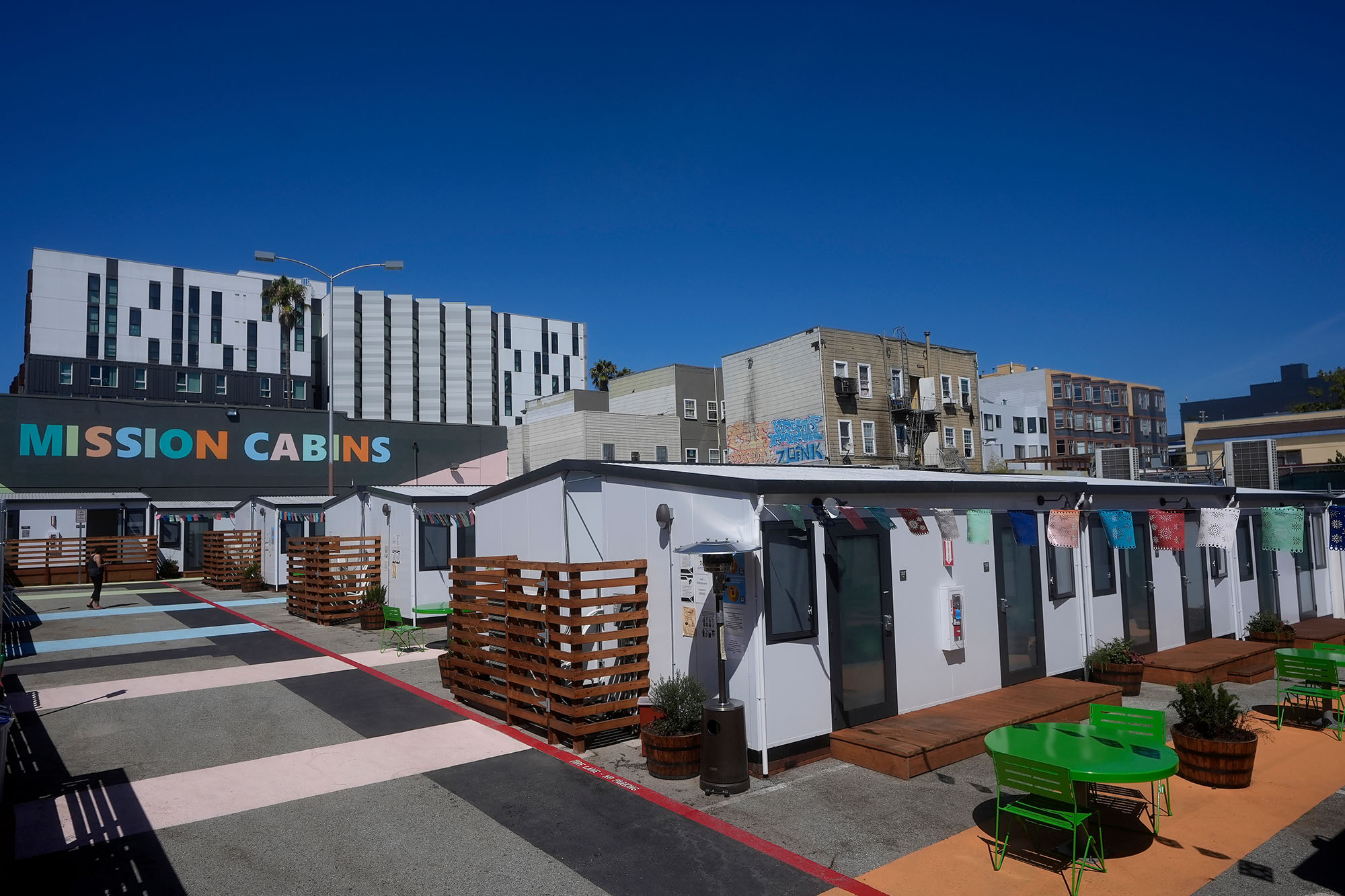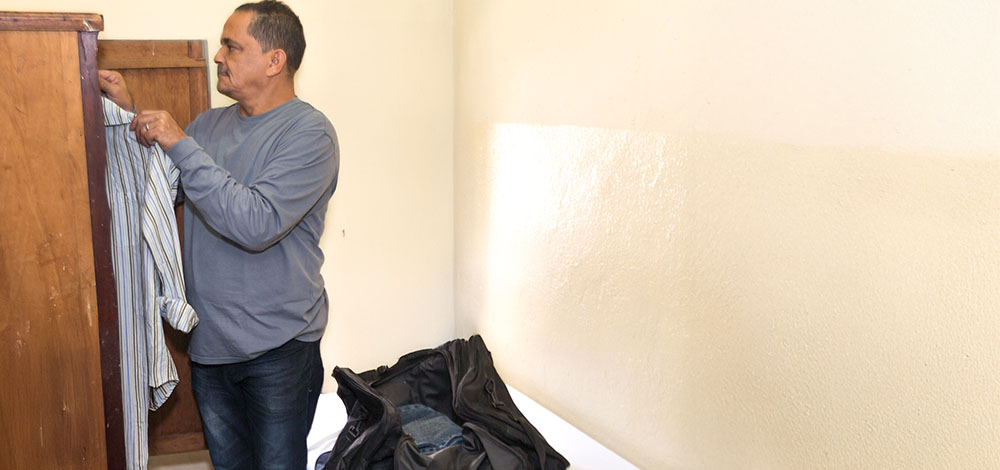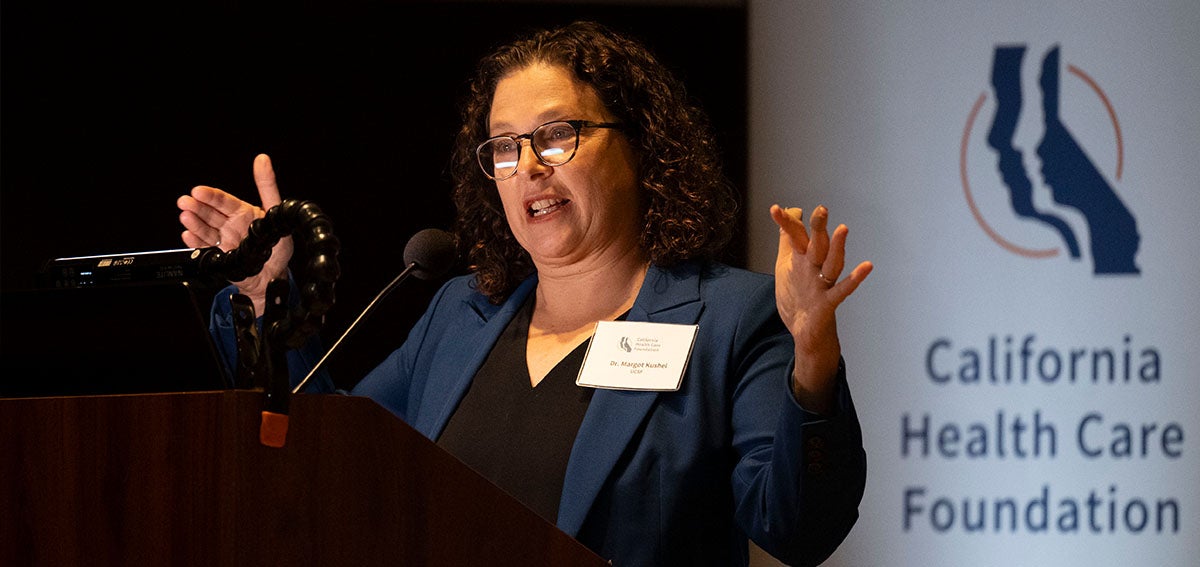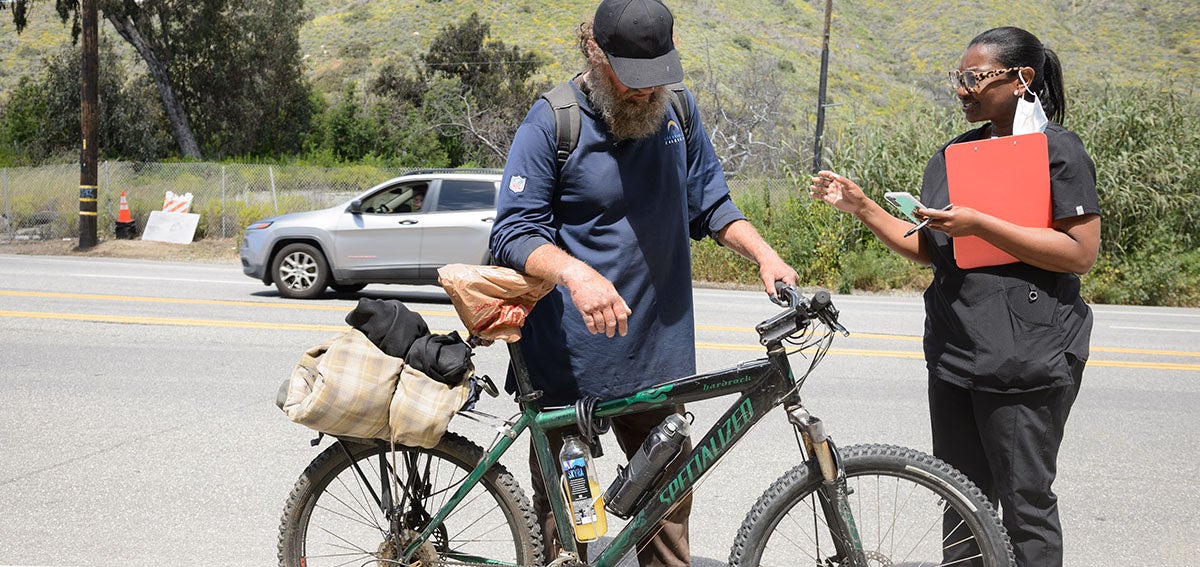|
Getting your Trinity Audio player ready…
|

Wesley Clutchett was released from prison at age 75. Having no place to live and no income, he moved from one temporary situation to another. Then he was connected to Oak Days, a former motel that was repurposed to house medically frail people and families in Alameda County.
“This place saved my life,” he said.
He means it literally. Not only did Oak Days put a roof over his head and provide a bed to sleep in, but as a requirement of admission he was sent for a medical workup. Doctors diagnosed him with advanced esophageal cancer. Thirty-three radiation treatments and six chemo sessions later, he’s lost more than 70 pounds and now weighs just 136 pounds. But he’s alive.
“I was sick, and my body’s still sick. I’m trying to heal. I’m still going back and forth,” Clutchett, now 80, said in early March. “Matter of fact, I got to go back to the oncologist on March the 14th.”
There are a lot of people like Clutchett in California. Living in encampments or in their cars, they have chronic, sometimes catastrophic health conditions that make it difficult or impossible to easily engage with the health delivery system. As a result, their life expectancy may be drastically shortened. Sometimes they die on the street.
Oak Days, a converted Days Inn motel near the Oakland Coliseum, was conceived to provide housing alongside health care and supportive services that people like Clutchett need — all funded through Medi-Cal. These patients may need intensive wound care, daily insulin injections, or dialysis. They might be bedbound or need help with toileting and bathing. Some are very sick with terminal cancer or end-stage liver disease.
Nursing Home Services
They require the kinds of services that are normally delivered in nursing homes, said Alexis Chettiar, the nurse practitioner and cofounder of Cardea Health, who conceived the medical service model behind Oak Days. But nursing homes often turn away people who might be socially unstable or aggressive, or who have psychiatric illness or substance use disorder in tandem with their physical health needs. And shelters often don’t accommodate people who need help with activities of daily living or who have complex medical needs. This leaves them no place to go.
Is the best we can do for people to let them live in tents when they are dying of cancer? It’s uncivilized.
— Alexis Chettiar, Cardea Health
“Sometimes they had been kicked out of a shelter,” Chettiar said, “because they are incontinent or have bad-smelling wounds. That’s how people land in a tent, in that condition.” She estimates there may be 300 people like Clutchett who need these services in Alameda County, and thousands more across the state.
Chettiar brings to this work not just a career in nursing practice but a doctoral degree in health policy. For many years she has been working with people experiencing homelessness. “These programs that are meant to serve medical beneficiaries who are this sick, they didn’t always reach the most socially unstable people,” she said. Her policy background gives her “a real clear picture of where the gaps are.”

Chettiar’s cofounder of Cardea Health, Catherine Hayes, also a nurse practitioner, elaborated: “Chronic homelessness accelerates aging and disease progression. They’re ineligible for housing. You could put them in an apartment, but who would take care of them? They would fall into homelessness again very quickly.” The idea that we can install the chronically ill in housing and then leave them alone “is really bonkers,” she said.
Hayes and Chettiar were hired early in the pandemic to be the local Alameda County medical directors of Project Roomkey, a statewide program to reduce the spread of COVID-19 among the unhoused population. The county took over a handful of empty motels and offered rooms to people both experiencing homelessness and at the highest risk of devastating outcomes. That county program served about 4,000 people at its peak, in seven hotels, until it was discontinued in 2022.
As the program wound down, the two nurse practitioners started to think about what they could do for the population they had identified. “We can’t put them back on the street,” Hayes said. “Many of these people are young and don’t want to be in a nursing home. We think they have the right to be stably housed and get the resources to support that.”
Housing Medically Frail People
By combining the housing services of a follow-on program called Homekey, and by tapping into established Medi-Cal funding and new offerings created under CalAIM, the state’s comprehensive reform of Medicaid services, Chettiar and Hayes developed a distinctive model that they believe is replicable. Indeed, in June, Cardea will open a new program in San Francisco.
For efficiency’s sake, they envisioned grouping the sickest people together in one building and bringing the services to them in a sustainable, stepwise continuum of care. If patients can be gathered into a single location, economies of scale can be achieved that make it possible to provide more services at less cost.
To pay for on-site health and personal care services, like administering medications or helping residents with toileting or feeding, Cardea Health has accessed the Home and Community-Based Alternatives waiver. Waivers like this one enable California to use Medi-Cal dollars to pay for these services, but waivers can be subject to capacity constraints and waiting lists, unlike other Medi-Cal benefits. Designed to keep people at home, the waivers are “a cost savings for government,” Hayes said. “It’s also something people deserve as they age and their illnesses progress.”
A main sticking point for Cardea Health is dealing with regulators. In Cardea’s most recent Joint Commission survey, the agency was cited because the client’s home was deemed to be unclean, not an environment suitable for provision of care. “We as an agency face consequences for that,” Chettiar said. “We serve people where they live.”
It left a sour taste in her mouth. “For us, they [the accreditation evaluators] were so hostile,” she said, saying things like, “‘Why don’t you get better clients? Why don’t you have shinier brochures? Then you could get better clients.’ It’s an ongoing challenge to satisfy these regulatory requirements and respect the dignity and choices of the people that that we serve.”
‘Structural Racism and Classism’ on the Regulatory Side
“It directly translates into other home health agencies declining to serve the people we care for,” Chettiar said. “Frankly, you’d have to be crazy to take on these patients who cause you such difficulty on the regulatory side. It’s structural racism and classism, and it’s pretty overt in this context.”
At Oak Days, Cardea Health provides the clinical coordination, but the housing is operated by a separate outfit, Five Keys, a nonprofit social services organization specializing in education and employment opportunities for people coming out of prison. The county bought the hotel for a rock-bottom price in the aftermath of the pandemic and leases it to Five Keys for a dollar a year.
This is a specialty just like cardiology or pediatrics. It’s a population that needs a certain level of expertise. We are proud of the people who work for us.
— Catherine Hayes, Cardea Health
Oak Days has 140 rooms and is staffed around the clock with five or six employees, said Brandi Taliano, the Five Keys site director, who also sits on the board of Cardea Health. “To empathize with unsheltered folks, you got to know where they come from,” she said. “We hire a lot of formerly incarcerated. Most of them had drug addictions, been homeless themselves, and they understand our unsheltered population.” Parole officers and transitional housing programs for ex-offenders refer people to the Five Keys training program, Taliano said.
Careful selection is important for clinical staffers too. “We hire the nurses we know who have a level of sympathy and dedication to this population,” Hayes said. “This is a specialty just like cardiology or pediatrics. It’s a population that needs a certain level of expertise. We are proud of the people who work for us. We are very thankful to have them.”
The model is working as intended, Hayes said. “We have managed to house folks who otherwise would have died on the street, for sure,” she said. “Look at our exit rate” — those who are discharged from the program because they are too sick or causing too many problems. “I cannot think of a single exit since this became a program that houses the medically frail. That speaks to the level of care we are providing. People come back from the hospital and nursing home and live successfully.”
80% Decline in Medical Services Utilization
Not only do they see a health status improvement in this population, but utilization and spending have decreased too. Cardea found that inpatient stays, ER visits, psychiatric visits, and nursing home stays have declined by nearly 80% (PDF) among Oak Days residents, representing an enormous savings for the people who pay the bills — indirectly the state and now directly the health plans contracted to CalAIM. With the long-term cost of nursing home care now under managed care plans, rather than the state fee-for-service program, health plans have a vested interest in supporting people to live outside nursing homes. Thus, a model such as Oak Days could be of material interest to these plans.
However, even if the Cardea and Five Keys combination model is judged a success so far, the waiver caps current participation at about 10,000 Medi-Cal enrollees. The waiting list is now almost 4,000 people. “Some people will not receive services in their lifetime,” Chettiar said. “Is the best we can do for people to let them live in tents when they are dying of cancer? It’s uncivilized.”
Unlike the waiver, CalAIM’s Enhanced Care Management and Community Supports are not subject to enrollment caps and could be a solution. But there are some gaps in what they cover that would need to be addressed.
Clutchett has a very personal outlook on his change of fortune. “I was a thug and a crook and a dope dealer. But since I’ve been here, these people here, like I say, they’ve blessed me. And when my birthday came, my 80th birthday, they brought me a cake and candles. I’m shocked!
“I have a chance now to get to know my kids, my grandkids. Without these people, I wouldn’t have been able to do that.”
Authors & Contributors
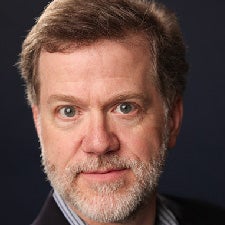
J. Duncan Moore Jr.
J. Duncan Moore Jr. is a freelance writer based in Kansas City, Missouri, who has been writing about health care for more than 25 years. He is a founder of the Association of Health Care Journalists.
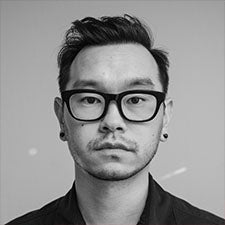
Jungho Kim
Jungho Kim is an Oakland-based photographer. He takes photos from his perspective as part of the Korean-adoptee diaspora — forever an outsider in an insider’s world — and is heavily influenced by his experiences living in the US, Japan, Sweden, and Korea. His work has focused on revealing the stories of those exploring their identities, experiencing inequity, or learning to adapt to our changing climates.
During the COVID-19 pandemic he spent extensive time with unhoused people and organizations providing them with basic necessities and community support. Kim also covered dozens of protests during the Black Lives Matter protests following the killing of George Floyd, including direct actions like the toppling of statues in San Francisco’s Golden Gate Park. In 2019, he documented the pro-democracy movement in Hong Kong, capturing quiet moments of resistance, defiant protesters, and violent crackdowns by police.

